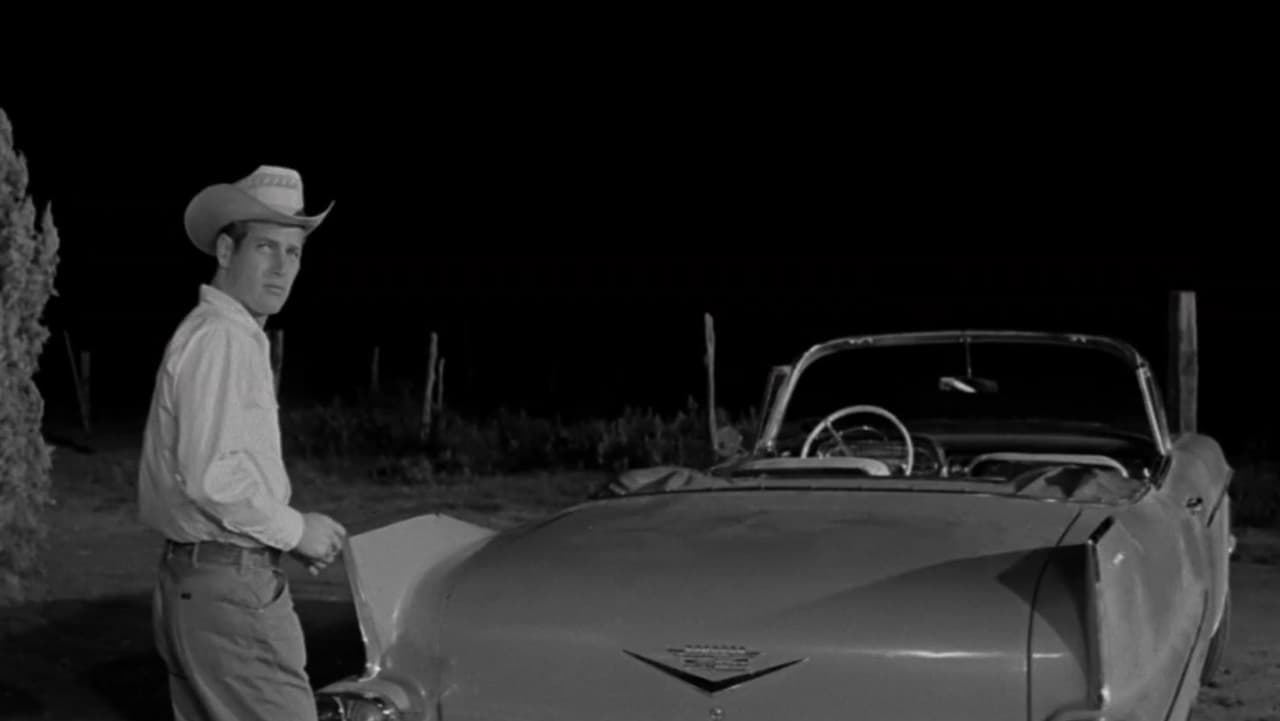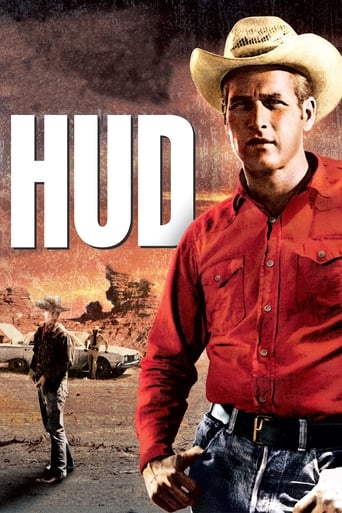Intcatinfo
A Masterpiece!
Livestonth
I am only giving this movie a 1 for the great cast, though I can't imagine what any of them were thinking. This movie was horrible
Salubfoto
It's an amazing and heartbreaking story.
Melanie Bouvet
The movie's not perfect, but it sticks the landing of its message. It was engaging - thrilling at times - and I personally thought it was a great time.
nautiyalati
Hud is a true masterpiece , I doubt if it was really made in 1963 because it shows the life of a hot blooded , party lover young man of 21st century . I mean who don't want a life like Hud , working in day , helping father in farm and then in the night driving to Town , grab a drink , talk to girls or taking her on a ride and partying all night .I really wish , i had a life like Hud but i was born in an Army family and following rules , regulation , discipline since childhood i know outside the Military area where i live people party , roam like free birds and have all the fun .well lets come back to the movie , its really awesome to have an older brother or uncle to company you and take care of you if you stuck in a fight or brawl , drinking together really brings family feelingsHaving an Old man in house is a good thing as he tries his best to maintain discipline in family and showing the right path , This movie will never fail to entertain you , you can watch it over and over again and you will never bore because every time you see it , it makes you partying out and having a fun Brawl after getting drunk !!!
jc-osms
Rare to see Paul Newman play such an anti-hero and it's clear he relishes it. Counterpointed by strong performances from veteran Melvyn Douglas as his long- suffering father, Patricia Neal as their worldly housemaid and the young newcomer Brandon De Wilde as the impressionable youth whose loyalties are tried, tested and ultimately destroyed by Uncle Hud's selfishness and boorishness.These four actors and their characters' inter-relationships are pretty much the movie in a story that feels at times theatrical but in fact was adapted from a novel. I'd describe the plot as like "Shane" reflected through Tennessee Williams, so that the perhaps mis-directed hero-worship of a young man is this time thwarted by an idol with feet of clay.Throughout the film, Hud does nothing admirable or selfless and sort of tolerates the young acolyte trailing in his wake before a drunken attempted rape of Neal breaks the spell. I didn't however like Neal's acceptance of her ordeal, especially when she says she would have eventually let him have her in the future, betraying an unacceptable streak of chauvinism in the writing. Better to watch are the tensions and conflicts between grandfather-patriarch Douglas, errant, number two son Hud (we're made aware that Hud is responsible for the premature death of the elder son, De Wilde's father) and De Wilde himself, torn between his admiration of the former and misplaced envy of the latter's hedonism.Newman's on record as saying this is one of his favourite of his own movies and it's easy to see why. He's hardly every off the screen and he's excellent in his cast-against-type lead role. A contemporary Western shot in beautifully-lit black and white by James Wong Howe and sensitively directed by Martin Ritt, this was a gripping and involving family saga featuring a great star turn by one of the best actors of the 60's.
oldgoldtop
A sad film portraying unintentional emotional destruction through misunderstanding and lack of compassion.In the opening sequence Lonnie's radio, carried in his chest pocket, plays the sad lyrics defining the film:___"I'm just driftwood floating down the tide ___I don't care where this old river carries me ___I'll keep drifting just because my heart is broken inside ___And I'm tired of wishing for what cannot be"Paul Newman gives a compelling performance as Hud Bannon, the tragically misunderstood son of Homer, an aging and principled cattleman who has never provided the parental love and nurturing his son so craved and needed. Hud has grown into a self centered womanizer hiding his inner pain with boozing and carousing, mistakenly believing Homer has never gotten over Huds role in his older brothers death in a car accident when Hud was a teenager. The reality, when revealed is much more painful for Hud and leads him to want to hurt back by planning to get control of the ranch! Newman brings to life a broken and tormented soul hiding behind a mask of self-centered indulgence speeding down life's highway in his pink Cadillac. Hud's concern for his father goes unnoticed while his father reaches out to grandson Lonnie. Hud has become cynical and is never able to obtain any fulfilling relationship with his father, Lonnie or their housekeeper Alma (another hurt and damaged soul afraid to love again). Hud's flings with married women illustrate his fear of being hurt in a real relationship and are more of a show...like the greased pig contest (where he gets some admiration without emotional risk). Homers hard heart is reflected in his hardening arteries and the hard baron Texas landscape. His crippling love of the ranch ultimately leads to the destruction of the family and is symbolically played out when Hud speeds up behind Lonnie in the pickup truck as they drive towards home and Homer is crawling on the dirt road. Lonnie (mistakenly) blames Hud for the old mans unwillingness to live, and blind to Hud's concern for Homer, becomes as hard as his grandfather. Lonnie's ultimate transformation is mirrored in a wide shot as he stands alone in the empty corals with the family's empty house in the background. Hud is hurt and left alone, donning a mask of indifference to repress his anguish, he closes the door and retreats inside the empty home. All are left damaged.I wondered why Hud would drive a pink Cadillac seemingly out of place, and wanted to see how it might provide a clue to Hud's character. Pink "...represents compassion, nurturing and relates to unconditional love and understanding, and the giving and receiving of nurturing". There are occasions when Hud shows compassion which can go unnoticed. Hud grew up without the nurturing love a child needs (and craves) from a parent. The Cadillac symbolizes Huds continued need for unattained desire and the inadequate substitution of an expensive impersonal luxury status symbol ("object" of desire). It might also reflect the loss of his mother who had provided the unconditional love missing from his father. Perhaps it reflects Homers love of the land (empty Texas" dirt") to Hud's love of his car (empty inanimate object). "wishing for what cannot be".Homer describes his love of his land and cattle. He states "It don't take long t' kill…not like it takes to grow". The irony is that he did not take the time with his son Hud and killed their relationship and Hud's outlook when Hud was a boy As Homer was dying, Lonnie says "…you never gave up on anything in your life!" Homer turns towards Hud I expected him to say "I gave up on Hud and I am sorry" and provide reconciliation and a happy ending. But with his dying breath he drives the nail into Hud and turns Lonnie.Homer sees the world in black and white yet what we call black and white on film is in reality shades of gray, a more accurate representation of reality which Homer could not comprehend.Homer explains "slowly the look of the land changes because of the men we admire". Imagine how biases and prejudices can be passed on. In the end Homer does pass on his flawed perception of Hud to Lonnie, killing any chance to redeem their relationship. The 1962 film likely reflects the periods growing movement to bring about positive changes with regards to race, gender and generational differences. The film opens with Lonnie looking to bring Hud home and ends sadly with Hud alone. The message I take away is that we need to look deeper into ourselves to find compassion and understanding to avoid passing on negative perceptions.Symbols?… Hanging lights often in the frame suggest a device to show a harsh light or perhaps unrealized "enlightening". Alma bumps her head on the light before turning it off and leaving. The railroad sign shown in the opening scene as Lonnie rides into town reads "4 TRACKS" which reminds me that the four main characters lives never connect (in the dry Texas land). "REST ROOM INSIDE" signs at bus stop suggest retreating inside oneself. Hud and Lonnie at the well is perhaps the films most heartwarming scene as they bond. Water is the life-giving force needed to exist in the dry Texas landscape. They drink from the well and embrace laughing and singing a camp song about the Titanic "it was sad, so sad…" The scene reinforces the value of relationships vital to our lives.Many see Homer's uncompromising principles as positive and noble, yet if as humans we are unable to live up to those expectations, are we to be thrown away as he did with Hud? Is our perception of perfection even correct? The shades of gray are where we exist and they are forever changing. Life is not always as clear as we (and Homer) might believe.
Mr Spark
One of Martin Ritt's true masterpieces. A movie that describes an egotistic man named Hud Bannon that torments the lives of his loved ones while he acts like a suitable role model for his younger nephew. The acting has truly changed my perception of Paul Newman who plays the anti-hero with great prominence and innuendo. Above all Patricia Neal's performance glitters like gold, her Oscar was well deserved. No need to mention the outstanding performance of Melvyn Douglas and Brandon De Wilde. The cinematography is where I really want to focus since I have never seen a Simple drama film like this have such a wonderful feeling of smooth camera work. The depiction of the plot on camera is subtle and uniquely satisfying. The scene that grasps my admiration is the murdering of the cattle, the way it is filmed leaves the viewer to assume and imagine the horror of what is happening in that pit. Overall i give this films a well deserved 8/10.

